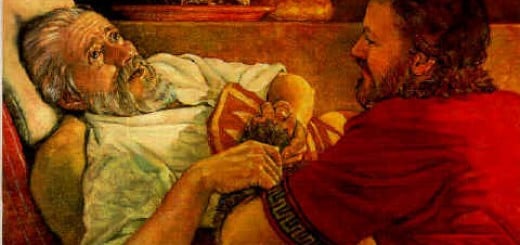
By Rabbi Ari Enkin, rabbinic director, United with Israel
There is not much we can learn from the wicked Esau, but when it comes to honoring our parents, he is certainly a fine example. He also had a great attitude.
This week’s Torah portion is Toldot (Genesis 25:19–28:9). The reading deals primarily with the conflict between Jacob and Esau, the adventures of Isaac and his wife Rebecca, and Isaac’s blessing of his sons.
One thing that is very clear right from the beginning is that Isaac’s twin boys went off in two very different “directions” in life. Jacob, of course, was the righteous one, living a life in the service of God. Esau was wicked, involved in the worst crimes.
Our sages teach us, however, that there was also one good thing about Esau: He had tremendous kibud av va’em – he was very particular in honoring his mother and father.
In fact, we are told that the great Rabbi Shimon ben Gamliel would frequently comment on how he could only wish to fulfill the mitzvah (Torah commandment) of honoring his parents like Esau did, saying:
“When I served my father, I served him in my regular, dirty clothes. But when I went out in public, I would wear clean, more dignified clothing. Esau, however, would only serve his father wearing his finest clothing as is if he were serving a king!”
Attitude is Everything
The question is asked: If Rabbi Shimon ben Gamliel was so cognizant and so upset that Esau outdid him by clothes he wore when serving his father, why didn’t Rabbi Shimon simply wear nice clothes when serving his father? Why did he simply complain? Why didn’t he do something about it?
One of the answers given is that Rabbi Shimon was not simply complaining about the clothes he wore, or the clothes that he should have worn. Rather, he was complaining that he didn’t have the right attitude towards the issue! Esau wore dignified clothing when serving his father because his attitude was that his father was a king, or at least that he should be treated like one. Rabbi Shimon, however, did not successfully internalize this lofty and commendable attitude. That’s what he was complaining about.
There is a very similar discussion in the Talmud, which teaches that there was woman named Kimchit who merited to have seven sons, all of whom became High Priests in the Temple. She attributed her good fortune to her high standard of modesty.
The question is then asked again: There were many women who kept, and who keep, the same high standard of modesty as Kimchit did. The answer is again the same: It’s not the clothing that caused Kimchit to merit seven sons who were all High Priests – anyone can wear modest clothing; it was her attitude towards the mitzvah that gave her merit.
There is not much we can learn from Esau, but when it comes to honoring our parents, he is certainly a fine example. Honoring our parents, or performing any mitzvah meticulously for that matter, is a very commendable thing to do. But even more significant is our attitude.
Click on the following links to read more articles by Rabbi Ari Enkin on this week’s Torah portion:
https://unitedwithisrael.org/living-torah-the-birthright-battle/
https://unitedwithisrael.org/a-bowl-of-stew-or-eternity/
https://unitedwithisrael.org/the-twins/
Do You Love Israel? Make a Donation - Show Your Support!
Donate to vital charities that help protect Israeli citizens and inspire millions around the world to support Israel too!
Now more than ever, Israel needs your help to fight and win the war -- including on the battlefield of public opinion.
Antisemitism, anti-Israel bias and boycotts are out of control. Israel's enemies are inciting terror and violence against innocent Israelis and Jews around the world. Help us fight back!
